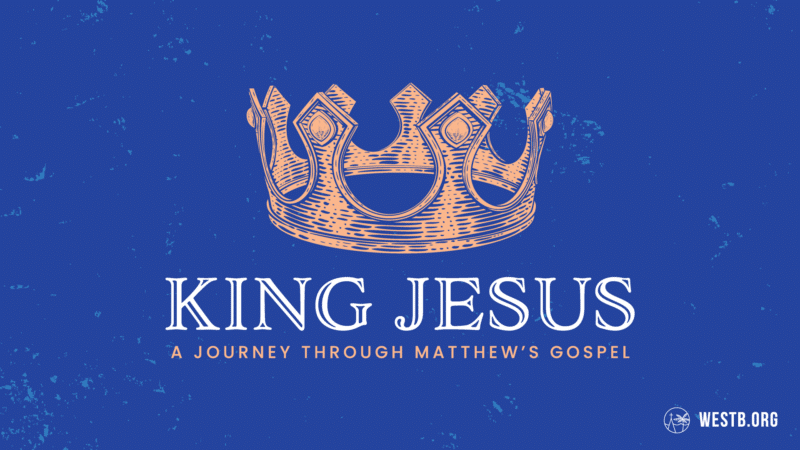Gotcha Questions for God
Series: King Jesus
Sermon Title: Gotcha Questions for God
Speaker: Sam Rainer
Date: October 6, 2024
Reflect
- Have you ever been in a situation where someone asked you a trick question? How did you respond?
- What’s a common question people use to challenge or trap others, especially in debates or arguments today? How do these compare to the “gotcha questions” Jesus faced?
Encounter
- In Matthew 22:15-22, when Jesus is asked about paying taxes to Caesar, how does His answer reflect a deeper truth about loyalty to God versus loyalty to earthly authorities? What is the significance of the coin’s image?
- Why do you think the Sadducees, who didn’t believe in the resurrection, asked Jesus their question about marriage in the resurrection (Matthew 22:23-33)? How does Jesus’ response reveal God’s perspective on life and eternity?
- In verses 34-40, Jesus summarizes the entire Law with two commandments. How do these commandments provide a foundation for how we live out our faith in everyday relationships?
Transform
- In what ways do we sometimes try to compartmentalize our lives—giving some parts to God and keeping others for ourselves? How can we give God all of our hearts, as Jesus teaches?
- How can we as a group encourage each other to love God and love our neighbors more fully, especially in situations where we might be tempted to focus on religious rules or personal rights over relationships?
Additional Discussion Questions
- How does Jesus’ response to the Pharisees about taxes challenge our view of earthly authority versus divine authority? How do we balance living as citizens of a nation and citizens of God’s kingdom?
- The Sadducees used Scripture to try and trap Jesus, but He turned it back on them. How can we be discerning in how Scripture is used in debates or discussions, making sure we’re focusing on God’s truth rather than personal agendas?
- Jesus summarized the Law with “love God and love your neighbor.” What are some practical ways we can live out these commandments in our daily lives, especially in a world that emphasizes individual rights and personal gain?
Interesting Facts and Tidbits
- Coin Imagery and Divine Claims: The denarius that Jesus used to answer the Pharisees’ question had an image of Tiberius Caesar, who claimed to be the “son of the divine Augustus.” This ironic situation set the scene for Jesus to contrast the false claims of earthly rulers with His own true divinity as the Son of God.
- The Sanhedrin’s Composition: The Sanhedrin’s Composition: The Pharisees and Sadducees, despite their deep theological and political differences, both held seats on the Sanhedrin, the highest Jewish tribunal. Their unity in trying to trap Jesus highlights the threat He posed to their power and influence.
- Marriage and the Resurrection: The Sadducees’ question about marriage in the resurrection (Matthew 22:23-33) was based on the Old Testament law of levirate marriage (Deuteronomy 25:5-6). Their intent was to mock the concept of resurrection, which they didn’t believe in, but Jesus refocused the conversation on God’s eternal perspective.
- Jesus’ Use of Psalm 110: When Jesus asked the Pharisees how the Messiah could be both David’s son and David’s Lord, He quoted Psalm 110. This is the most frequently cited Old Testament passage in the New Testament, underscoring its messianic significance.
- The Silent Response: After Jesus’ final question (Matthew 22:41-46), the Pharisees and Sadducees didn’t dare ask Him any more questions. This wasn’t just fear of being embarrassed—it signaled their acknowledgment that Jesus’ wisdom and authority surpassed theirs.
Related Passages
- Romans 13:1-7 (Submission to Authorities): This passage expands on the idea of giving to Caesar what is Caesar’s and to God what is God’s. Paul explains how Christians should view earthly authorities and their responsibilities toward them, making it a great complement to Jesus’ teaching in Matthew 22.
- Deuteronomy 6:4-5 (The Shema – Love the Lord Your God): Jesus quotes this central Jewish prayer when He summarizes the Law with “love the Lord your God with all your heart, soul, and mind.” It emphasizes the deep connection between devotion to God and living out His commandments.
- Leviticus 19:18 (Love Your Neighbor): Jesus also quotes this command when summarizing the Law. It’s a reminder that loving others is an essential part of fulfilling God’s will, not just personal piety or ritual observance.
- Psalm 110:1-4 (The Messiah as David’s Lord): This is the psalm Jesus referenced in Matthew 22:44, pointing to His divine nature as both David’s descendant and his Lord. Understanding this psalm helps illuminate the identity of Jesus as the Messiah.
- Matthew 6:24 (Serving Two Masters): This passage from earlier in Matthew emphasizes that we cannot serve both God and money, which echoes Jesus’ point about loyalty and giving what is due to God. It offers a helpful lens to view His teaching about the coin and taxes.
Key Terms:
- Gotcha Question: A question designed to trap someone into giving an answer that can discredit or embarrass them.
- Pharisees: A Jewish sect during Jesus’ time that focused on strict adherence to the Law and traditions. They were respected by common people but often clashed with Jesus.
- Sadducees: Another Jewish sect that was aristocratic, aligned with Rome, and denied supernatural beliefs like the resurrection.
- Resurrection: The belief that the dead will be raised to life. The Sadducees denied this, but Jesus affirms it, especially in Matthew 22:32 (“I am the God of Abraham, Isaac, and Jacob”).
- Messiah: The anointed one promised in the Old Testament, who would be both the Son of David and the Lord, as Jesus demonstrates in Matthew 22:41-46.

